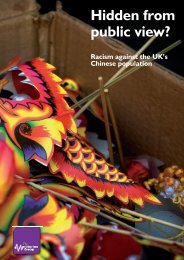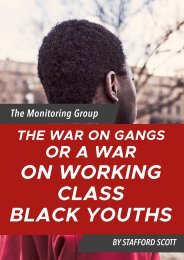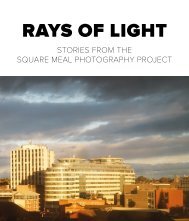Coming of Age : 1976 and the Road to Anti-Racism
Coming of Age : 1976 and the Road to Anti-Racism by Jagdish Patel and Suresh Grover
Coming of Age : 1976 and the Road to Anti-Racism
by Jagdish Patel and Suresh Grover
You also want an ePaper? Increase the reach of your titles
YUMPU automatically turns print PDFs into web optimized ePapers that Google loves.
was nationalised. If labour from <strong>the</strong> coloured’ Commonwealth <strong>and</strong> colonies was still needed, its intake <strong>and</strong> deployment<br />
was going <strong>to</strong> be regulated not by <strong>the</strong> market forces <strong>of</strong> discrimination but by <strong>the</strong> regula<strong>to</strong>ry instruments<br />
<strong>of</strong> <strong>the</strong> state itself. The state was going <strong>to</strong> say at <strong>the</strong> very port <strong>of</strong> entry (or non-entry) which blacks could<br />
come <strong>and</strong> which blacks couldn’t -- <strong>and</strong> where <strong>the</strong>y could go <strong>and</strong> where <strong>the</strong>y could live — <strong>and</strong> how <strong>the</strong>y should<br />
behave <strong>and</strong> deport <strong>the</strong>mselves. Or else... There was <strong>the</strong> immigration <strong>of</strong>ficer at <strong>the</strong> gate <strong>and</strong> <strong>the</strong> fascist within:<br />
racism was respectable, sanctioned, but with reason, <strong>of</strong> course; it was not <strong>the</strong> colour, it was <strong>the</strong> numbers<br />
— <strong>and</strong> for <strong>the</strong> immigrants’ sakes — for fewer blacks would make for better race relations — <strong>and</strong> that, surely,<br />
must improve <strong>the</strong> immigrants’ lot. It was a <strong>the</strong>me that was shortly <strong>to</strong> be honed <strong>to</strong> a fine respectability by<br />
Hattersley (6) <strong>and</strong> <strong>the</strong> Labour government. Evidently, hypocrisy <strong>to</strong>o had <strong>to</strong> be nationalised. And in pursuit <strong>of</strong><br />
that earnest, <strong>the</strong> Labour government <strong>of</strong> 1964 would make gestures <strong>to</strong>wards anti-discrimina<strong>to</strong>ry legislation. (7)<br />
Meanwhile, <strong>the</strong> genteel English ‘let it all hang out’. In April 1963, <strong>the</strong> Bris<strong>to</strong>l Omnibus Company discovered that it did not<br />
‘employ a mixed labour force as bus crews’ — <strong>and</strong> freed from shame by <strong>the</strong> new absolution, it announced fearlessly<br />
‘a company may gain say fifteen coloured people <strong>and</strong> lose, through prejudice, thirty white people who decide <strong>the</strong>y<br />
would sooner not work with <strong>the</strong>m’. But if Bris<strong>to</strong>l — with three generations <strong>of</strong> black settlers <strong>and</strong> built on slavery — was<br />
only weighing up <strong>the</strong> statistics <strong>of</strong> prejudice, Walsall (with its more recent experience <strong>of</strong> blacks) made <strong>the</strong> more scientific<br />
pronouncement that ‘coloured can’t react fast in traffic’. Bol<strong>to</strong>n simply refused <strong>to</strong> engage ‘riff-raff any longer. (9)<br />
The police felt liberated <strong>to</strong>o. They had in <strong>the</strong> past appeared <strong>to</strong> derive only a vicarious pleasure from attacks on<br />
blacks; <strong>the</strong>y had <strong>to</strong> be seen <strong>to</strong> be neutral. Now <strong>the</strong>y <strong>the</strong>mselves could go ‘nigger-hunting’ — <strong>the</strong> phrase was <strong>the</strong>irs —<br />
while <strong>of</strong>ficially polishing up on <strong>the</strong>ir neutrality. In December 1963, <strong>the</strong> British West Indian Association complained <strong>of</strong><br />
increasing ‘police brutality’ stemming from <strong>the</strong> passing <strong>of</strong> <strong>the</strong> Commonwealth Immigrants Act. In 1964 <strong>the</strong> Pakistani<br />
community alleged that <strong>the</strong> wrists <strong>of</strong> Pakistani immigrants were being stamped with indelible ink at a police station<br />
in <strong>the</strong> course <strong>of</strong> a murder investigation: it was irrelevant that <strong>the</strong>y had names <strong>and</strong>, besides, <strong>the</strong>y all looked alike. (10)<br />
In 1965, WISC (<strong>the</strong> West Indian St<strong>and</strong>ing Conference, which replaced <strong>the</strong> more moderate St<strong>and</strong>ing Conference <strong>of</strong><br />
West Indian Organisations in UK after <strong>the</strong> fall <strong>of</strong> <strong>the</strong> West Indian Federation in 1962) documented police excesses<br />
in Brix<strong>to</strong>n <strong>and</strong> surrounding areas in a report on Nigger-hunting in Engl<strong>and</strong>. (11) And at <strong>the</strong> ports <strong>of</strong> entry immigration<br />
<strong>of</strong>ficers, given carteblanche in <strong>the</strong> ‘instructions’ h<strong>and</strong>ed down by <strong>the</strong> government, were having a field day.<br />
At <strong>the</strong> local level, tenants’ <strong>and</strong> residents’ associations were organising <strong>to</strong> keep blacks out <strong>of</strong> housing. The number<br />
<strong>of</strong> immigrants had increased considerably in <strong>the</strong> two years preceding <strong>the</strong> ban: <strong>the</strong>y were anxious <strong>to</strong> bring<br />
in <strong>the</strong>ir families <strong>and</strong> dependants before <strong>the</strong> doors finally closed. Housing, which had always been a problem<br />
since <strong>the</strong> war, became a more fiercely contested terrain. The immigrants had, <strong>of</strong> course, been consigned <strong>to</strong><br />
slum houses <strong>and</strong> forced in<strong>to</strong> multi-occupation. Now <strong>the</strong>re were fears that <strong>the</strong>y would move fur<strong>the</strong>r afield in<strong>to</strong><br />
<strong>the</strong> white residential areas. At <strong>the</strong> same time, public health laws were invoked <strong>to</strong> dispel multi-occupation.<br />
Schooling, <strong>to</strong>o, presented a problem. as more <strong>and</strong> more ‘coloured’ children began <strong>to</strong> enter <strong>the</strong> country <strong>and</strong> sought<br />
places in <strong>the</strong>ir local schools. In Oc<strong>to</strong>ber 1963, white parents in Southall, which had a high proportion <strong>of</strong> Indians, dem<strong>and</strong>ed<br />
separate classes for <strong>the</strong>ir children because coloured children were holding back <strong>the</strong>ir progress. In December<br />
<strong>the</strong> Commonwealth Immigrants’ Advisory Council (CIAC), which had been set up <strong>to</strong> advise <strong>the</strong> Home Secretary<br />
on matters relating <strong>to</strong> ‘<strong>the</strong> welfare <strong>and</strong> integration <strong>of</strong> immigrants’, reported that ‘<strong>the</strong> presence <strong>of</strong> a high proportion<br />
<strong>Coming</strong> <strong>of</strong> <strong>Age</strong> | 43<br />
<strong>Coming</strong> <strong>of</strong> <strong>Age</strong> Final version 16.10.indd 43 17/10/2017 12:07







